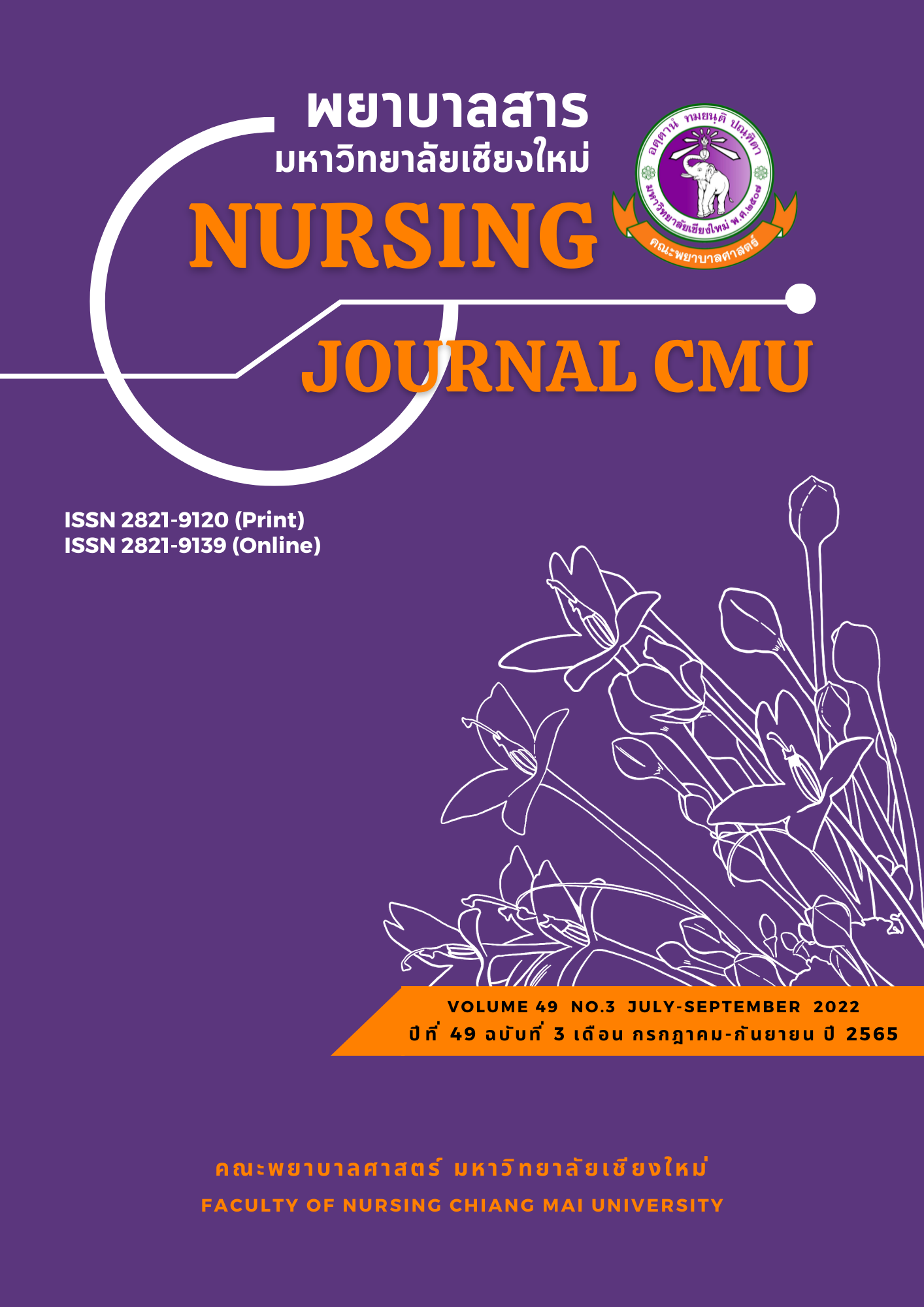Effects of Experiential Learning on Knowledge, Screening, and Advice Regarding Opisthorchiasis Among Village Health Volunteers
Keywords:
Experiential learning, Opisthorchiasis, Screening, Advice for opisthorchiasis, Village health volunteersAbstract
This quasi-experimental research study aimed to investigate the effects of experiential learning on knowledge, screening practices, and advice regarding opisthorchiasis among village health volunteers. The sample consisted of 23 village health volunteers at Thawangtan Health Promoting Hospital, Saraphi district, Chiang Mai province, and random sampling was used. The research instruments consisted of: 1) the experiential learning package of knowledge, screening practices, and advice regarding opisthorchiasis; 2) a personal information questionnaire; 3) a questionnaire on knowledge, screening and advice regarding opisthorchiasis; 4) a screening practice observation form; and 5) an observation form for advice regarding practice related to opisthorchiasis. The research instruments were tested for content validity and reliability. Data were analyzed by descriptive statistics and Fisher’s exact probability test.
The results showed that, following participation in the experiential learning program,
the levels of knowledge among village health volunteers were statistically significantly higher than before participation (p = .027), and the levels of screening and advice practices for opisthorchiasis were statistically significantly higher than before participation in the program (p < .001).
This study showed that the experiential learning program can improve knowledge, screening practices, and advice regarding opisthorchiasis among village health volunteers. Therefore, it should be used to enhance the capacity development of village health volunteers.
References
Burns, N., & Grove, S. K. (2009). The practice of nursing research: Appraisal, synthesis and generation of evidence. (6th ed.). St. Louis, MO: Elsevier.
Department of Mental Health, Ministry of Public Health. (2000). Handbook of participatory training. Nonthaburi: Wongkamon Productions. (in Thai).
Health Information Mission Group. (2016). Public health statistics 2015. Strategy and Planning Division Ministry of Public Health Office. Retrieved from https://www.nationalhealth.or.th/en/node/175. (in Thai).
IARC Working Group on the Evaluation of Carcinogenic Risks to Humans. (1994). Schistosomes, Liver Flukes and Helicobacter pylori. Lyon, 7-14. IARC Monographson The Evaluation of Carcinogenic Risks to Humans, 61, 1-241. Retrieved from: https://www.ncbi.nlm.nih.gov/books/NBK487782/
Information Technology Division National Cancer Institute. (2018). Cancer registration at the hospital level year 2017. Bangkok: Pornsap Printing. (in Thai).
Kaewphitun, N., Sathapolratchapoom, A., Kaewphitun, S., Rattanasarong, W., Ngamnuan, A., & Ruchirakun, R. (2011). Epidemiology of liver fluke in Thailand. Srinagarind Medical Journal, 26 (Suppl), 133.
Kolb, D. A. (1984). Experiential learning: Experience as the source of learning and development. New Jersey: Prentice-Hall.
Leiper, R. T. (1911). Notes of the occurrence of parasites presumably rare in man. Journal of The London School of Tropical Medicine, 1(1), 16–19.
Meathip, N., Tamdee, D., & Puttharakkun, P. (2016). Effects of experiential learning on knowledge and screening practice and advice for hypertension among village health volunteers, Nursing Journal, 43(5). 104–115. (in Thai).
National Assembly for Health 7 (2014). Removal of liver fluke and bile duct cancer in people. Retrieved from https://ddc.moph.go.th/uploads/publish/1057720201009062730.pdf
Pramoosin, O. (2017). Effects of participatory learning of family members on knowledge and practice in dietary for older persons with uncontrollable hypertension(Unpublished master's thesis). Chiang Mai University, Thailand. (in Thai).
Poomphakwaen, K., Promthet, S., Kamsa-ard, S., Vatanasapt, P., Chaveepojnkamjorn, W., Klaewkla, J., … Pichainarong, N. (2009). Risk factors for cholangiocarcinoma in Khon Kaen, Thailand: A nested case-control study. Asian Pacific Journal of Cancer Prevention, 10(2), 251–258.
Ruenkham, R. (2007). The effect of the participatory learning program on knowledge, attitude and skill self-examination of women of the public health volunteers (Unpublished master's thesis). Naresuan University, Thailand. (in Thai)
Saengsawang, P., Promthet, S., & Bradshaw, P. (2013). Infection with Opisthorchis viverrini and use of Praziquantel among a working-age population in northeast Thailand. Asian Pacific journal of cancer prevention, 14(5), 2963–2966. doi.org/10.7314/apjcp.2013.14.5.2963
Sansri, N., Lertwatthanawilat, W., & Unahalekhaka, A. (2015). Effect of experiential learning on efficiency of Targeted Hospital Associated infection surveillance among infection control ward nurses. Nursing Journal, 42 (4). 36–47. (in Thai).
Wicha, P. (2013). Effectiveness of using participatory learning program on breast examination self-breastfeeding in prison inmates in Chiang Mai Woman Correctional Institution. (Unpublished master's thesis). Chiang Mai University, Thailand. (in Thai).
Wykoff, D. A., Harinasuta, C., Juttijudata, P., & Winn, M. M. (1965). Opisthorchis viverrini in Thailand – The life cycle and comparison with O. felineus. The Journal of Parasitology, 51(2), 207–214.
Yotsapanya, A., Saithakham, S., Chanmaha, B., & Thaewnonngio, K. (2015). Prevalence and factors affecting the occurrence of liver fluke disease in Loei Province, 2013. Journal of the Office of Disease Prevention and Control, Khon Kaen Province, 22(1), 28-38.(in Thai).
Downloads
Published
How to Cite
Issue
Section
License
Copyright (c) 2022 Nursing Journal

This work is licensed under a Creative Commons Attribution-NonCommercial-NoDerivatives 4.0 International License.
บทความที่ได้รับการตีพิมพ์เป็นลิขสิทธิ์ของวารสารพยาบาลสาร
ข้อความที่ปรากฏในบทความแต่ละเรื่องในวารสารวิชาการเล่มนี้เป็นความคิดเห็นส่วนตัวของผู้เขียนแต่ละท่านไม่เกี่ยวข้องกับมหาวิทยาลัยเชียงใหม่ และคณาจารย์ท่านอื่นๆในมหาวิทยาลัยฯ แต่อย่างใด ความรับผิดชอบองค์ประกอบทั้งหมดของบทความแต่ละเรื่องเป็นของผู้เขียนแต่ละท่าน หากมีความผิดพลาดใด ๆ ผู้เขียนแต่ละท่านจะรับผิดชอบบทความของตนเองแต่ผู้เดียว






